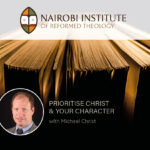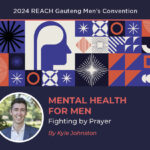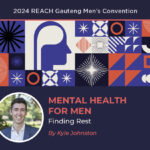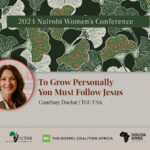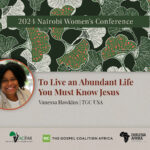The Nairobi Institute of Reformed Theology exists to equip men and women for faithful gospel ministry. Over three conversations sourced from the Ekklesia Afrika podcast Studious: For The Church, Joshua Lemayian discusses different aspects of theological education and how they should all ultimately point us to Christ.
How should we approach theological studies? What is the end goal of your time in seminary? In this interview, Mike Christ from the Nairobi Institute of Reformed Theology (NIRT), argues that the most valuable thing we stand to gain from theological study is growing in our Christian character.
The learning of truth isn’t the end in itself.
It would be a deep loss if we approached theological study as a goal in and of itself. This is true for all studies. Mike Christ challenges us, “All education, in some sense, becomes theological education. Because it should aim to make God the subject of our supreme care and love, from which everything else flows.” Growth in our Christian character will always be linked to God being the subject of supreme care and love.
For learning and study of any subject to happen, caring must first take place. Growth in Christian character becomes, as Mike Christ puts it, “Learning to care about the right things and being impressed by what God has done.” Theological studies then become about ordering our caring and submitting to God’s order of things.
The encouragement and invitation of this interview is to allow theological studies – and, in fact, all studies, to be a way of growing into the kind of person that God is calling us to be. In that way, theological studies become studies for our Christian character.
More on Theological Study for Character Formation
Faithfulness in the Humdrum
10 Mistakes I Made as a Theological Student
Mental Health for Men: Fighting by Prayer
The Only True Foundation for Human Identity and Worth
Transcript
Podcast Transcript: Studying Theology as Character Formation
Guest: Mike Christ (Theological Educator)
Host: Ekklesia Afrika Podcast, Studios
Host:
Hello, and welcome to this episode of Studios, a podcast brought to you by the Nairobi Institute of Reformed Theology. If you’d like to learn more about NIRT, please go to ekklesiiaafaffrika.org/seminary. If you’d like to learn more about how you can support the work there, you can get some details on how to do that right there on that page.
Today, I’m joined by Mike Christ, who serves as the Director—Director at NIRT. And Mike, this is your number what—semester now—of the year?
Mike:
Of the time that we’ve been doing…? Oh gosh. So, we’re in our third year for some of the students, yeah. So, um, we’d be like in our ninth or tenth semester—or term, rather.
Host:
Yeah, three years. There’s the hope of one or two students completing their studies, and those will be the first graduates from NIRT this year?
Mike:
Yes, yeah. They won’t have done all of the Puritan classes, I don’t think, quite yet. But I think we will have, for one of our students, run them all the way through our three-year program.
Host:
Right.
Mike:
So, that’s quite an accomplishment for the students, and kind of exciting as well to see that come together.
Host:
Right—so, last year, during the annual NIRT dinner—which I hope is a custom; by me calling it “annual” I’m assuming that it’s going to be a custom—you gave a talk that was very helpful for me and several other people who were there as well. And you titled it Theological Education as Character Formation. That’s what we want to talk about today: how theological education is an exercise in character formation.
And you began with the question: Why are the students there? Why are they in a theological institution? Could you tell us about how one could begin to answer that question, as we—as—as character formation?
Mike:
Yeah. I think a lot of people come into seminary—and really all education—without having a clear idea as to what their goal is. Like, what are they actually trying to accomplish?
And I think that, insofar as sort of Western Enlightenment ideas about education have influenced not only theological education but all education, we can tend to think of education as, you know, this professional, kind of skill-based, “in order for me to do this task” kind of thing.
And of course, we’re not running from that. That is part of it, right? We want people who are skilled in exegesis, skilled in, you know, training people for the church. We want people skilled in exegesis who can be good counselors. We want them to, you know, be able to think theologically well. So, there are skills that we’re certainly after.
But I think we also need to think about: What kind of person are we becoming as we think about education? And we need to realize that that’s happening one way or another—we’re being discipled into being a certain kind of being a certain kind of person, living a certain kind of life, through our education.
And the question is: Is the education actually aiming in the right direction? And are we embracing it in the way that I think God intends education to be embraced—that is, to shape us into a kind of person?
So, thinking of education as character formation is saying then that we would want to enter into seminary—enter into theological studies—not just to know more facts, not just to be able to understand more things, but in the process of doing that, become more godly. Become better husbands and fathers, and wives and mothers, and friends, and so forth and so on.
Host:
Yeah, yeah. So the learning of more facts or the learning of truth does not become just the end in itself, but it becomes a means towards something else—the formation of a whole person.
Mike:
Yeah, yeah. The formation of a whole person. As we – probably anticipate some of the other things we’re going to talk about—as we learn to care about those truths— we wouldn’t want to think of those facts and everything as merely means to an end, in the sense of, I don’t know, maybe like the food that we eat as a means to growing stronger or something like that.
In a way, the focus is on those things that we’re learning, because we’re trying to get out of ourselves and say, “Let me care about something else. Let me care about these people in church history that I’ve never encountered until now. Let me care about the Greek language.” Um, because God made that as a way of communicating His Word.
And as I learn to care about these things deeply, then in that caring, I am incorporating those things into my life—more so than if it’s just, you know, “Okay, memorize these facts.” So, yeah, we would want to see the learning as—the way of learning is also the way of growing into the kind of person that God is calling us to be, that can be useful for the church.
Host:
Yeah, yeah. I love that connection between learning and caring—that for learning to happen, caring must, first of all, take place.
And in that talk, you talk the book Loving to Know by Esther Meek, a Christian philosopher. Could you tell us just about that work itself, first of all, and how it particularly influenced your thinking in this research?
Mike:
Yeah. I—I stumbled upon that book many years ago. And, um, it’s—it’s long, but helpful. What she’s doing is she’s building on the philosophy of a philosopher of science named Michael Polanyi. And she is recognizing that in order to learn things, there is a sense that it’s a whole-person endeavor. So learning involves caring.
The book, Loving to Know—she wrote another book called Longing to Know—and this idea, that sense of desire, is part of the learning process. Loving, longing, caring about these things. And she also talks about how, you know, we should think about knowing—epistemology—in relation to the process of learning. We shouldn’t consider those two things as vastly different.
You know, in a philosophy department, philosophy of education is one thing, and then epistemology, the study of knowledge, is another. And she’s really trying to bring them together—to say, “If we study what makes learning happen, we’re also studying what makes knowing happen.”
And that the knowing process happens when we start to think, “I think there might be something there.” You know, that process where you stumble upon a really half-baked idea or a phrase and you’re like, “Wait a minute—there’s another way to look at that. I can build on this to something.” But it’s not clear. If someone were to ask you to explain it, you wouldn’t be able to explain it.
But you’ve got some sense that, “I think if I keep going in this direction, I might find something that’s worth knowing, worth building things upon, worth using, that can be helpful for people.”
Mike:
And, uh, you know, this idea—that “If I keep going in this direction, I might find something…”—and then, often, sometimes we’re wrong. But often, we do. And sometimes the thing that we find—the thing that we learn—is, like, we had no idea it was there. But we get this sense that there’s something there, and if I keep going on…
And she likens that to the way that we know people. And this is Polanyi’s idea—that all knowledge is personal knowledge. So, we kind of come to know facts in the same way that we would come to know people.
And if we think about it—when we get to know people—we don’t do that from the perspective of, you know, studying them like they’re in a lab. They unfold to us on their own terms. And it’s a way—you might meet somebody for the first time, and there’s just something about them. You can’t even define it exactly, but you think to yourself, “I’d like to get to know that person more.”
And you’d like to get to know them based on the fact that you already know something is there—that makes you say that you want to do that. And so she says learning—and knowledge—is sort of like that. That personal relationship there, where you’re studying something and you get the idea, “I think there’s something in this direction…” And so it sort of unfolds for us in that way.
That involves a sense of caring. That involves a sense of whole-person desire. And a sense that this thing that I’m learning is going to be useful—like, “I want to learn this because of the changes that could happen in me, and in others, and help be used for my community, for my church,” and so on.
Host:
Yeah, it kind of reminds me of one of those virtues in classical education—piety. Which, in classical education, assumes that you always begin with piety. Which means you give everything and everyone their due. And so there’s a sense in which you already have respect for whatever you’re going to learn—or whoever you’re learning—and that gives you a posture of humility and desire to do right by them.
Mike:
Yeah.
Host:
And so, when you come to the Greek language, you seek to learn it in a way that gives it its due. Um, it’s not uncommon in our context to hear someone say something like, “Why did I have to learn this? It doesn’t even matter anymore,” or “Why did I have to learn the parts of an insect?” You know, “It does not have anything to do with my day-to-day life.”
Does that reveal, in any way, a disservice that was done to that student? Or might that be revealing something that’s faulty in that student in their understanding of knowledge and learning and truth?
Mike:
Yeah, yeah. I think… I mean, it also could be revealing something about the class, right?
Host:
Mm-hmm.
Mike:
Yeah. So from one perspective—from the teacher’s perspective—as I agonize about what books to assign, there is a sense that we are asking, “How is this book going to be useful?” And, “Are we going to have them learn things that they’ll never actually use?” And so, you know, that concern isn’t entirely irrelevant. But yeah, I think there is a fundamental problem if that’s sort of the grid that students are using.
First of all, I think there ought to be a sense of trust between student and teacher—you know, that the teacher is really caring about the student. So it goes the other way too: am really trying to think through, “How do I bring the student along, and what is the goal that I’m trying to form them into?” There needs to be a huge commitment on the teacher’s perspective.
And then I think it’s helpful for there to be trust on the student’s perspective. You know, the student may grow up and realize, “Okay, that way of learning wasn’t what I wanted to do.” That may happen—it’s not that teachers are infallible. But there’s a sense of the teacher as a guide, and the student as… it’s kind of like an apprenticeship going on.
You know, if you’re being apprenticed to be a woodmaker or something like that, and the person who’s teaching you how to file something—or, I have no idea about wood making so I’m out of my league very quickly here—but you can imagine there might be some things at the very beginning where the student says, “Well, I don’t know why I need to do that.” But they need to trust that that will be revealed as they go.
So I think that whole relationship between student and teacher is really important to see—what’s going on here? Why is there a teacher and we are not just learning from books? Book learning is great, and we want to do that. But we also think that the teacher is helpful as a kind of guide, and there needs to be a sense of trust there.
Host:
And is the teacher, in some sense, a model of that caring? That they care about this?
Mike:
Yeah, yeah—I think so. And I think that’s one of the things we brought out in the talk: that if you look at what the students actually retain from the class—because, you know, you can measure this, right? You can give the students an exam two years after the class and say, “What did you actually remember from that class?”
Host:
That’s always humbling for the teacher.
Mike:
Yes! And for the students too. But over and over again, the things that they remember are the things the teacher cared about—even if the teacher didn’t say, “This is what I care about, so make sure you study it because it’s going to be on the test.” There’s just a sense that that care gets… imparted to the students. And they begin to see the value of that, even sort of, you know, by proxy. Right?
Host:
Yes.
Mike:
They are able to borrow the teacher’s caring about these things so that they can begin to learn how to care, and learn how to know.
Host:
So help us connect that caring with character formation—how that has paid off in the formation of a person.
Mike:
Yeah. So I think, in a way, one of the things it does is—it gets us outside of ourselves. Right? So if I am just learning things so that I can make a lot of money, so that I can finish this degree and get a job—or worse, even in the church, if it’s so I can be the one who has all the theological answers—then we end up making that education just about ourselves. We’re wanting to use that knowledge for an agenda that we already have.
And like you said, that’s opposite of the pietas, the piety, that we need—where we say, “No, I care about these things. There is a history to them. There is an integrity to these things that I care about. They represent people with history. They represent parts of the world that God has made.”
And in that caring about them—that they’re worth knowing—I’m becoming a person who cares about the right things.
I mean, if you think about the relationship between knowledge—the idea of knowing—and personal knowing: a good person is one who cares about the right people in the right way. And that helps us become a better person. If we’re only thinking about ourselves, and the conversations that we have are only about, “What can I get out of this relationship?”—we’re not a good friend. We’re not a good spouse. We’re not a good child.
So, learning to care about the right things, being impressed by what God has done—”Wow, this is what God has done; this is how He was working”—it just gets us out of ourselves. And we, yeah, become better people.
And then, especially when looking at theology—to learn theology just so that I can sort of master it and be the master, I’m not going to be submitted, myself.
Host:
Yeah, so the other thing is that idea of submission.
Mike:
Mm-hmm.
Host:
And you talk—yeah, that’s a big one. Please go into that.
Mike:
Yeah. I mentioned the idea that, you know, sometimes we think of learning as mastering, but there’s a way in which we could also think of it as being mastered. Because to learn is to submit to the ways in which this thing is known. Just like you would when trying to get to know a person, right? You kind of learn from them how you will get to know them. Right? And they open up in different ways.
Host:
You learn them on their own terms.
Mike:
Yeah, yeah. And so, you know, we need to learn Greek on its own terms. We learn history on its own terms—by submitting to the way in which that thing is known. And by not just drawing conclusions right away, like, “Hey, this is boring or useless,” but trying to learn from it what its value is and how it will be useful.
That makes us people who don’t jump to conclusions too quickly. Who can sit and listen—be slow to speak, quick to listen—and I think that just helps us become the kind of godly people that God has made us to be.
Host:
Amen, amen. it kind of reminds me of that—yeah, that famous quote from Augustine about our growing godliness as an ordering of loves. And he’s thinking about the stuff you’re learning as helping you to know what to care about, and how much care you should direct toward it.
And sin, in some ways, is actually directing care and love toward the wrong thing—at the expense of the right thing. And in that way, therefore, rightful education—not just theological education, but all education in some sense—becomes theological education. Because it should aim to make God the subject of our supreme care and love, from which everything else flows.
Mike:
Yeah, that’s a good way to put it.
Host:
Could you talk about John Webster’s quote here—on what dogmatics are, and how this comes to bear when we start to think about theological education specifically? John Webster defines theology in this way. He says:
“Dogmatics—or we could say theology—is that delightful activity in which the Church praises God by ordering its thinking towards the gospel of Christ, set in the midst of the praise, repentance, witness, and service of God’s holy people. Theology directs the Church’s attention to the realities which the gospel declares and attempts responsibly to make those realities a matter of thought.”
Mike:
Oh, that’s such a good quote. When I did this talk for the first time, I just read the quote, and I realized… no one was really getting much from that! [Laughs] And I think I said something like, “We need to submit to the ways of knowing,” which everything is made to be known, but that wasn’t really the way to help people know that.
Yeah, because there’s just so much there. But I think, if I try to remember why I actually put that in there, in the talk, the idea is that theology is—it’s not just facts, right? It’s oriented to this reality that’s out there. The reality that the gospel makes possible.
Host:
And that’s not just an amorphous, abstract thing, but actually it’s ordered thought that requires diligence. That requires us to submit to the terms in which the gospel has been presented.
Mike:
Right.
Host:
I think the reason that struck a chord—just reading through it again—is that theology… because we know that God is love, and we can often read “love” as also just leniency. And of course, God is gracious. But that can mean, therefore, that because God is love, He’ll just accept me however I am—and that means I can make of His news, and His great news of the gospel, whatever I want to make of it.
I can actually know God on my own terms. But when we actually come to read the gospels, when we actually read the Bible, we see that this gospel is presented in a particular form that we need to submit to, in order—in an ordered way—in order for us to truly appreciate it and to actually make rightful use of this news.
It’s not just a set of things that I can make into my own cocktail. Which, particularly in our time, I guess, can be a temptation. When I’m asked what the gospel is, I can say, “Well, the gospel the way I think of it…” And that might be true, but it can also mean, “The gospel, from the way I’ve come on top of it and decided what it means.” And that’s not as helpful.
But instead, we need to learn it according to the terms that God has given us.
Mike:
Yeah, yeah. And I think that phrase too—“set in the midst of the praise, repentance, witness, and service of God’s holy people.Theology directs the church’s attention to the realities the gospel declares.” There are so many things going on in there. That’s typical of Webster.
But the idea that praise, repentance, witness, and service of God’s people is what we do with the gospel—I think we could also say that’s a way in which we know the gospel as well.
One of the things I think is really helpful to connect is the way in which knowing and living are worked out. I think a wrong view of that connection would just be to say, “Well, I learn things, and then I live by them.” And yes, that’s part of it.
But there’s also a way in which a certain kind of living opens up the door for knowing more deeply, knowing more fully, knowing the purpose for which the thing was actually given.
You see that in Scripture too—where it talks about in Colossians, Paul prays that we would know God, that we would walk in a way worthy of Him, and then we would know Him more. That’s part of his prayer there. There’s this circle.
And I think if we recognize that these things that the gospel was leading us to do —as we do those things, there’s a way in which those actions, those repeated actions, help us come to a better understanding of the gospel.
There’s an author, Drew Johnson, who brings out the fact that there are several times in the Old Testament rituals where God says, “Do this, that you may know.” You know—have this feast, that you may know. Do this action, that you may know.
And there’s a sense in which, with our sort of thin idea of education—particularly theological education—sometimes that doesn’t make any sense. Like, “How do I do something to know it? I’m supposed to know it, then do it!”
Host:
But actually, there’s a way in which living out these things—that’s part of the learning process. And that loving and longing and caring—is that… Yeah, um, you conclude this talk with an anecdote from your own days in school. Could you talk to us about that?
Mike:
Yeah, that was a fun thing to share. So, I did my undergrad at a secular university, and I had this brilliant professor for a class on the philosophy of Nietzsche. And it was a strange experience because he loved Nietzsche. He believed in Nietzsche. He was a really good professor.
He would basically preach Nietzsche sermons—reading the text, explaining what it meant in the original German, and then making practical applications to our lives. He was doing, honestly, a better job than a lot of pastors do—just really loving the text and bringing that out for others.
I was the only Christian in the class. But he was a good professor. I did well enough in the class, and he respected my Christian positions. I even argued for the gospel in my paper, and that was fine.
Anyway, years later, I happened to be back at the school and I was reading a book when he walked by. He was an eccentric guy—he got right in my face and just said, “Master the material.” And I thought, wow. He was a model to me of real learning and scholarship—in the way that he did understand the subject matter he was teaching so well.
So I took that as encouragement to master my seminary studies, master these things that I was learning. But then it dawned on me later: the way he meant “master the material”—coming from a Nietzschean worldview—would be radically antithetical to the kind of mastery in the opposite direction, from how we’re called to learn and develop in theological education.
For Nietzsche, knowledge was always about power. You’re going to master the material so you can do something with it; to be the overman, to be the one who really calls the shots and everything relates to you.
I don’t think we can think of learning or seminary studies in that way because we don’t learning for the sake of being the ones that everything relates to you, the ones that have all the power. We learn in order to serve.
As Jesus said, the one who’s greatest must be the least, must be the servant of all.
Our learning should really put us in a place where we are decentered. Where we see God as the center of everything, where we see that to know Him is the greatest thing. And our goal is to point others to that knowledge.
So It’s not really self-referential; but it’s rather, you know, living outside of ourselves, unto God, and through Him.
Host:
Amen. Yeah, that’s so instructive. Could you tell us practically how that looks like when thinking about the classroom setup—maybe starting even with the curriculum. You’ve already mentioned this a little bit, but what does it look like coming into the classroom? What kinds of assignments you give and the kinds of exams? And how the students should think about their fellow students?
Mike:
Yeah, that’s great. So, I guess if you think of it from a student’s perspective— if they come in, what do they see?
Well, first of all, in terms of curriculum, what students will see is that there are a lot of classes that aren’t immediately “practical” in a way. Some seminaries you get a lot of classes like “church leadership” or “church administration.” Instead, we want classes that go deep into theology, learning the languages, a lot of classes in church history.
Because we think that in learning those things, we’re becoming a better person, a newer person. And we also think that many of the so-called practical things are better learned in the church.
And we do have a few classes—like Mark [Dever] recently come and taught a class on practical ecclesiology. So we’re not completely shunning those things. But students will notice a lot of classes that that do appear very academically oriented and they are very academically oriented.
I think also that the students would encounter a professor who isn’t just the, you know, the ‘answer man’, the ‘answer person.’ They don’t have…usually most of the lectures aren’t prepared in such a way that the students just writes down everything that the professor says as though that word is the, you know, is truth in a sense.
Rather, what they’re going to encounter, I hope, is a professor that exudes humility and excitement about the material material and then is able to help apprentice the students, how they can learn those things as well.
The teacher’s job is to help the students learn the way of knowing for that material, so there is a lot of reading in the class, a lot of difficult reading that doesn’t just like supplement the lectures but rather goes the other way.
It’s more like you’re going to learn through books, you’re going to learn through great books that have stood the test of time, that are by people who really know and care a lot about their subject. And then the professor, who also knows and cares about that subject, is going to guide the students into the learning through those books.
So we spend a lot of time in class discussing. In our church history classes the students will notice that they don’t have a church history textbook assigned to them. Rather, they have primary sources from the time that we’re studying and that’s a goal to try to make these people in church history real and say that they’re worth caring about, they’re worth learning about, they’re worth knowing.
And so, we want to guide students in that way.
And there are a lot of the books are not so easy to read, and what that also communicates is that it’s worth the discipline of careful focus, study, to learn how to read these things. And I think that is also going to make us a better person. It’s going to make us somebody who’s not so distracted, you know, on social media or something like that, but we’re going to have to wrestle with a paragraph for a long time sometimes in order to understand it.
So I think the students would notice that.
Then also in terms of the assessment aspect; the tests and the papers- they’re designed, well, first of all, the exams, a lot of my exams end up being oral exams because what I want to do is not just see if the student has memorized these answers, but I want to sort of test them.
I want them first of all to be relating to a real person who cares about the information too and then just see how they do as they get more follow-up questions thrown at them about what they have learned.
So it’s a really hopefully testing to see how well they’ve internalized the information and it’s also to be sort of a guide and encouragement, that it’s not where we’re just looking for the one thing they don’t know and then, “Ah you didn’t know that!” But also to be able to relate to somebody who they know is for them and yes is going to test them but is also going to be for them and wants them to learn the material and grow.
So it’s a lot more of a personal way to learn.
And then the papers do a variety of things, at least in my classes. Sometimes they act as sort of essay questions where it’s going to be something that we’ve talked about in class and I want the students to kind of think through, “How do I articulate this? How do I communicate this?” Because that process is going to help it grow deeper.
And then sometimes they’re more research oriented, to say, okay, find something you care about and then work on that. So for instance, in the anthropology class that I’m teaching, the students are going to write a paper on a very very narrow topic that’s something that they care about and then they’re going to present it to the class.
So that way, it gets a sense of learning and community and helping one another learn in what we’re doing. I also generally encourage students to, you know, share their papers with others and learn from one another so that we don’t have a context where people are in competition, you know? “It’s going to be graded on the curve so I want to make sure I don’t really help other students because…” That’s not the case of what it is at all.
And thankfully, the students don’t even think that way in this context. Here, they’re so eager to help one another in general, but I want to really help to encourage that and to play on that strength of the students.
Host:
Yeah, that’s so good. Thank you so much, Mike. This is very helpful—just in our thinking of how Christ is formed in us. That’s what we mean when we talk about character formation, right? We’re not just taking about some amorphous way.
But as you talked about how this compares to someone like Nietzsche thought about why you learn and why you master the material. It’s so that Christ can be formed in us. And it’s just so good to see how going to seminary is not retreating from Christian formation, how NIRT is seeking to do that very thing – aid their students in their journey as Christians, in sanctification.
Thank you again for joining us today.
And thank you for listening to this podcast. We would love for you to visit our page: ekklesiafrika.org/seminary
And you can learn more about the classes that are being offered and the ways in which you can work going on at the Nairobi Institute of Reformed Theology.
Until next time—may the Lord be with you.
Michael Christ directs the Nairobi Institute of Reformed Theology (NIRT), a division of Ekklesia Afrika that trains pastors and church leaders in Nairobi, Kenya.


